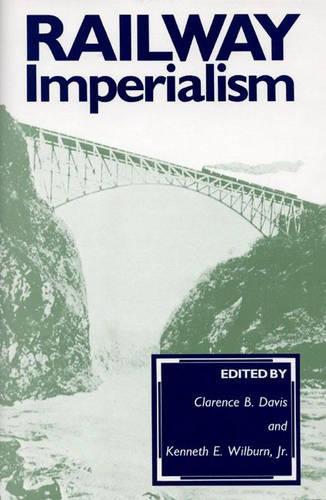
Railway Imperialism
(Hardback)
Publishing Details
Railway Imperialism
By (Author) Clarence B. Davis
Edited by Kenneth E. Wilburn
Edited by Ronald E. Robinson
Bloomsbury Publishing PLC
Praeger Publishers Inc
30th April 1991
United States
Classifications
Tertiary Education
Non Fiction
History of ideas
Social and cultural history
Transport industries
385.09
Physical Properties
Hardback
248
Width 156mm, Height 235mm
595g
Description
This contributed volume explores the relationship between imperialism, railways, and informal empire. Contributors account for the origins of mainlines in several independent and self-governing countries. The essays reflect on the imperial and anti-imperial effects of railways, whose rails traced the divergent paths of expanding capitalism, imperial strategy, and modernizing nationalism. The reader is thereby offered an opportunity of seeing the slippery notion of informal empire in operation, and of testing its validity. The railway has often been studied from the standpoint of imperialism; this book makes a beginning with studying imperialism from the standpoint of the railway. Following the book's introduction, which explains the imperial model considered in each chapter case study, the book opens with essays on railway imperialism in Canada, South Africa, Central Africa, Argentina, Mexico, the Indian States, Thailand, Russia and China. The last essay, written by Ronald E. Robinson, ties the book together with an engaging analysis of railway imperialism. This book should appeal to researchers and students interested in the history of railways.
Reviews
Essays in this collection cover European and American railway construction and strategy in Argentina, Canada, Central Africa, China, India, Mexico, South Africa, and Thailand. Although the essays vary in quality, they pursue a similar theme, namely, that railroad mania spread outside Europe and the US after the mid-19th century and that these widely scattered ribbons of iron and steel created altered patterns of trade and power. "The locomotive clearly had a unique propensity for integrating and annexing territory, for monopolizing its resources, and for preempting the future of great stretches of country. All of these implications . . . gave rise to a distinctive type of railway imperialism, which added a new dimension to European expansion and projected it to a higher pitch of intensity over a vastly extended range." The volume is blessed with an exceptionally thoughtful concluding essay, "Railways and Informal Empire," which ties together effectively the individual pieces. Since no previous work explores the relationship between railways and imperialism, this title holds considerable value, most of all to economic, political, and social historians. It is well documented, contains helpful maps, and includes a usable selected bibliography. Upper-division undergraduates and above.-Choice
Every essay is based on extensive archival research, and the result is one of the best general contributions to the economic history of imperialism in recent years.-Business History Rev
"Every essay is based on extensive archival research, and the result is one of the best general contributions to the economic history of imperialism in recent years."-Business History Rev
"Essays in this collection cover European and American railway construction and strategy in Argentina, Canada, Central Africa, China, India, Mexico, South Africa, and Thailand. Although the essays vary in quality, they pursue a similar theme, namely, that railroad mania spread outside Europe and the US after the mid-19th century and that these widely scattered ribbons of iron and steel created altered patterns of trade and power. "The locomotive clearly had a unique propensity for integrating and annexing territory, for monopolizing its resources, and for preempting the future of great stretches of country. All of these implications . . . gave rise to a distinctive type of railway imperialism, which added a new dimension to European expansion and projected it to a higher pitch of intensity over a vastly extended range." The volume is blessed with an exceptionally thoughtful concluding essay, "Railways and Informal Empire," which ties together effectively the individual pieces. Since no previous work explores the relationship between railways and imperialism, this title holds considerable value, most of all to economic, political, and social historians. It is well documented, contains helpful maps, and includes a usable selected bibliography. Upper-division undergraduates and above."-Choice
Author Bio
CLARENCE B. DAVIS is Vice President for Academic Affairs at Keene State College, Keene, New Hampshire. KENNETH E. WILBURN is a Professor in the Department of History at East Carolina University, Greenville, North Carolina. RONALD ROBINSON is Emeritus Beit Professor of the History of the British Commonwealth in Oxford University and Fellow of Balliol College.
